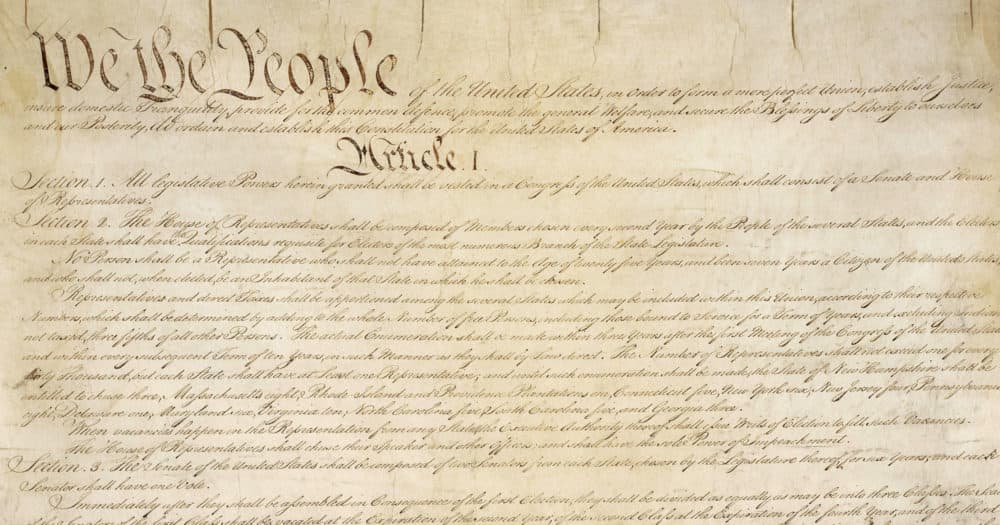Advertisement
Sedition, Impeachment And The 25th Amendment: Legal Questions Raised After Capitol Riots
Resume
The insurrection caused by pro-Trump extremists at the Capitol on Wednesday has raised a litany of legal and constitutional questions.
Democratic Rep. Ilhan Omar of Minnesota announced she was drafting articles of impeachment against President Trump. Omar blamed the president for Wednesday’s chaos, which stalled Congress' certification of the Electoral College vote.
Another term that arose in the aftermath of the insurrection was sedition, a technical term defined as conspiring to overthrow the U.S. government, hinder the execution of laws or steal U.S. property, all by using force, says Noah Feldman, professor of law at Harvard University.
Feldman says parts of the definition can be twisted to fit what unfolded on Wednesday, but a protester who enters a federal building or breaks a barrier will likely not be charged with sedition, a law that’s “rarely implemented.”
For someone from the Capitol mob to be charged with sedition, their intent to overthrow the U.S. government has to be obvious, he says. Feldman says the mob, by the looks of it, was trying to interfere with government operations, which isn’t the same as an attempt to overthrow.
“There is a law of the United States that says how we should count the ballots, and the protesters were trying to interfere with that,” he says. “So in that sense, they were opposing the authority of the United States. And the question then is, were they doing that by force?”
While force was used — windows broken and barriers toppled over, plus some people were armed — others protestors were exercising their rights in an ordinary manner, he says. There are multiple ways to view this, Feldman says, but ultimately, he’d be “astonished” if any pro-Trump extremists were charged with sedition.
“From the standpoint of hard statutory language, it would be very difficult to prove beyond a reasonable doubt that the conduct that we observed counted as sedition under the law,” he says.
Trump spoke to his supporters just before they stormed the Capitol, repeating his false claims that the election was stolen. He encouraged supporters to walk to the Capitol to “cheer on” legislators who were planning on objecting the Electoral College certification.
The president reiterated to the crowd that they'll “never take back our country with weakness” and that they have to demonstrate “strength.”
From a legal perspective, incitement under the First Amendment says “it has to be directed to inciting imminent, lawless action and be likely to incite or produce that action,” he says.
Trump’s speech incited immediate lawless action, satisfying the second half of the definition, he says. But he says one could argue Trump’s words didn’t directly call on supporters to partake in specific lawless action.
“He's calling for a protest march on the Capitol and that's perfectly lawful and constitutionally protected, in fact,” he says. “Similarly, when the president spoke later and told his supporters to go home while telling them that he loved them and that the election was being stolen, he was pretty careful not to use words that directed imminent lawless action.”
Trump’s word choices could have been deliberate, much like Marc Antony’s famous speech in Shakespeare’s “Julius Caesar,” where the meaning of the words is clear even if the statement is not, Feldman says. Still, proving incitement in a court of law would be difficult, he says.
Senate Democratic Leader Chuck Schumer has called for the removal of Trump from office through invoking the 25th Amendment, which would involve Vice President Mike Pence and the Cabinet coming together and agreeing to temporarily put the president’s power in the hands of Pence.
Feldman says it’s an unlikely move because it would require a majority of Cabinet members as well as two-thirds of both the Senate and the House.
However, he says the fact it’s even being reportedly discussed among Cabinet members signals “there was a moment where reasonable people thought that the president had just gone much, much, much too far.”
Impeachment is still possible with less than two weeks left in Trump’s term, but it’s not completely realistic, Feldman says.
What matters most for those who support impeachment and seek “long-term consequences” is banning Trump from running for office again in the future, he says, but it would take a separate vote apart from the impeachment vote.
When Democrats have control of the White House and both chambers of Congress, pursuing impeachment after Trump is out of office would likely be prevented by the Constitution, he explains.
“That might look too much like what the Constitution prohibits, a so-called bill of attainder, which is a law that attaints someone for criminal conduct by virtue of not a trial, but of congressional action,” he says.
Lawmakers had their chance to remove Trump from office in early 2020 when the House sought to impeach him for abuse of power and obstruction of Congress.
“I was there. I testified that he should be impeached and removed,” he says. “I believe that was correct then, and we shouldn't forget that we had an opportunity to do that.”
Julia Corcoran produced and edited this interview for broadcast with Tinku Ray. Serena McMahon adapted it for the web.
This segment aired on January 7, 2021.

